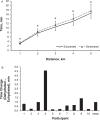Mild dehydration and cycling performance during 5-kilometer hill climbing
- PMID: 23952038
- PMCID: PMC3867084
- DOI: 10.4085/1062-6050-48.5.01
Mild dehydration and cycling performance during 5-kilometer hill climbing
Abstract
Context: Hydration has been shown to be an important factor in performance; however, the effects of mild dehydration during intense cycling are not clear.
Objective: To determine the influence of mild dehydration on cycling performance during an outdoor climbing trial in the heat (ambient temperature = 29.0°C ± 2.2°C).
Design: Crossover study.
Setting: Outdoor.
Patients or other participants: Ten well-trained, male endurance cyclists (age = 28 ± 5 years, height = 182 ± 0.4 cm, mass = 73 ± 4 kg, maximal oxygen uptake = 56 ± 9 mL·min(-1)·kg(-1), body fat = 23% ± 2%, maximal power = 354 ± 48 W).
Intervention(s): Participants completed 1 hour of steady-state cycling with or without drinking to achieve the desired pre-exercise hydration level before 5-km hill-climbing cycling. Participants started the 5-km ride either euhydrated (EUH) or dehydrated by -1% of body mass (DEH).
Main outcome measure(s): Performance time, core temperature, sweat rate, sweat sensitivity, and rating of perceived exertion (RPE).
Results: Participants completed the 5-km ride 5.8% faster in the EUH (16.6 ± 2.3 minutes) than DEH (17.6 ± 2.9 minutes) trial (t1 = 10.221, P = .001). Postexercise body mass was -1.4% ± 0.3% for the EUH trial and -2.2% ± 0.2% for the DEH trial (t1 = 191.384, P < .001). Core temperature after the climb was greater during the DEH (39.2°C ± 0.3°C) than EUH (38.8°C ± 0.2°C) trial (t1 = 8.04, P = .005). Sweat rate was lower during the DEH (0.44 ± 0.16 mg·m(-2)·s(-1)) than EUH (0.51 ± 0.16 mg·m(-2)·s(-1)) trial (t8 = 2.703, P = .03). Sweat sensitivity was lower during the DEH (72.6 ± 32 g·°C(-1)·min(-1)) than EUH (102.6 ± 54.2 g·°C(-1)·min(-1)) trial (t8 = 3.072, P = .02). Lastly, RPE after the exercise performance test was higher for the DEH (19.0 ± 1.0) than EUH (17.0 ± 1.0) participants (t9 = -3.36, P = .008).
Conclusions: We found mild dehydration decreased cycling performance during a 5-km outdoor hill course, probably due to greater heat strain and greater perceived intensity.
Figures



References
-
- Gonzalez-Alonso J, Mora-Rodriguez R, Below PR, Coyle EF. Dehydration markedly impairs cardiovascular function in hyperthermic endurance athletes during exercise. J Appl Physiol. 1997;82(4):1229–1236. - PubMed
-
- American College of Sports Medicine. Sawka MN, Burke LM, et al. American College of Sports Medicine position stand: exercise and fluid replacement. Med Sci Sports Exerc. 2007;39(2):377–390. - PubMed
-
- Gonzalez-Alonso J, Mora-Rodriguez R, Below PR, Coyle EF. Dehydration reduces cardiac output and increases systemic and cutaneous vascular resistance during exercise. J Appl Physiol. 1995;79(5):1487–1496. - PubMed
-
- Nybo L, Jensen T, Nielsen B, Gonzalez-Alonso J. Effects of marked hyperthermia with and without dehydration on VO(2) kinetics during intense exercise. J Appl Physiol. 2001;90(3):1057–1064. - PubMed
-
- Montain SJ, Coyle EF. Influence of graded dehydration on hyperthermia and cardiovascular drift during exercise. J Appl Physiol. 1992;73(4):1340–1350. - PubMed
Publication types
MeSH terms
Substances
LinkOut - more resources
Full Text Sources
Other Literature Sources
Medical
Miscellaneous

